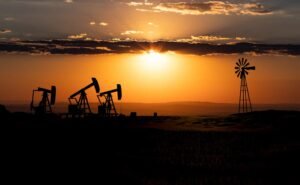Behind bars at DR Congo’s most infamous jail

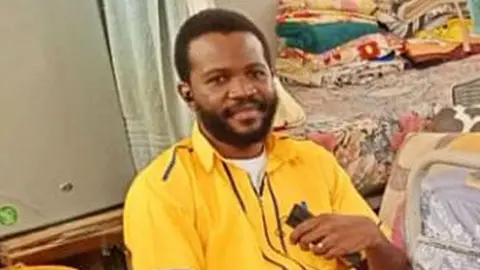 Stanis Bujakera
Stanis BujakeraIn making an attempt to explain Makala Jail – the scene of a lethal and failed breakout this week within the Democratic Republic of Congo – two individuals who have been inside used the very same phrase: “hell”.
“Makala is a real hell,” Stanis Bujakera, a former inmate and journalist, advised the BBC about DR Congo’s largest jail.
Bujakera was despatched to the infamous Makala Jail in September final yr, after the authorities accused him of writing an article that alleged the army had been concerned in an opposition politician’s demise. He spent six months there.
“Makala shouldn’t be a jail, however a detention centre resembling a focus camp, the place individuals are despatched to die,” he mentioned.
The jail, positioned in capital metropolis Kinshasa, has a capability of 1,500 prisoners however is estimated to carry round 10 occasions extra.
This cramped inhabitants ranges from petty criminals to political prisoners to murderers.
Human rights teams have lengthy complained of the dire situations Makala inmates face, together with overcrowding, unsubstantial meals and poor entry to scrub water.
Following a catastrophe on the facility earlier this week, these situations have been thrust into the highlight as soon as once more.
After plenty of inmates tried to interrupt out of Makala within the early hours of Monday morning, 129 prisoners misplaced their lives, Inside Minister Jacquemain Shabani mentioned.
Two dozen had been shot lifeless as they tried to flee, Mr Shabani reported, however most had been suffocated in a crush.
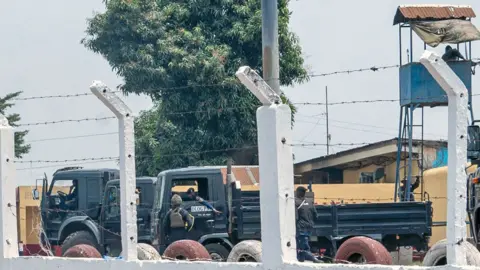 EPA
EPA4 surviving inmates advised the New York Occasions that previous to the escape try, prisoners had been held in stifling cells with out working water or the electrical energy to energy followers for greater than a day-and-a-half.
Some prisoners had initially damaged out to flee the warmth, they mentioned.
Bujakera mentioned these situations had been removed from uncommon – faucets “continuously” run dry at Makala, whereas “electrical energy is random, leaving the detainees with out gentle for days on finish”.
“Inmates are actually deserted to their destiny, uncovered to overcrowded and unsanitary situations that foster contamination and the unfold of illness,” he added.
Prisoners die “day by day” consequently, Bujakera mentioned.
Rostin Manketa, government director of Congolese human rights group La Voix des Sans Voix, shares an analogous account.
He has visited Makala a number of occasions and concluded that when an individual has been despatched to Makala Jail, “it looks like [they] have been despatched to hell”.
Stark movies filmed by Bujakera throughout his time in Makala present dozens of sleeping males, packed tightly collectively on the ground of an overflowing room.
Their limbs overlap, and in a fragile balancing act some males sleep atop the partitions that divide bathe stalls.
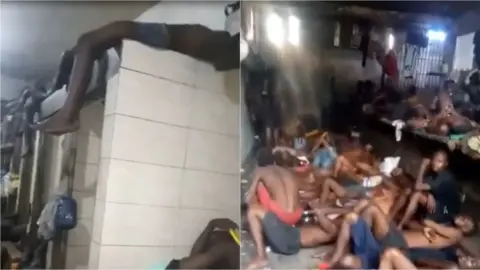 Stanis Bujakera
Stanis BujakeraSituations are higher in Makala’s VIP part, a separate pavilion that solely the minority can afford – you get a mattress and extra space, for instance.
Bujakera was requested the pay $3,000 (£2,280) to remain in VIP, however he managed to get this worth slashed to $450 (£340) for his keep.
He advised the BBC: “Financial inequalities between inmates create a hierarchy… the poorest are deserted to their destiny.”
What’s extra, wardens at Makala have little presence. Legislation and order contained in the jail is successfully delegated to the inmates themselves.
“Prisoners govern themselves,” Fred Bauma, a human rights activist who was incarcerated in Makala from March 2015 to August 2016, advised BBC’s Deal with Africa podcast this week.
“It’s such as you’ve modified nations and there’s a brand new authorities and it is advisable to study these guidelines.”
This technique of self-government is dysfunctional and results in “dangerous energy dynamics, acts of violence and conflicts between inmates”, Bujakera mentioned.
However Makala shouldn’t be alone with its abysmal situations – prisons all around the nation are chronically underfunded and overcrowded.
In line with the World Jail Temporary undertaking, DR Congo’s jails are the sixth-most overcrowded globally.
The authorities have acknowledged this drawback on quite a few events. Following Monday’s jailbreak, Deputy Justice Minister Samuel Mbemba blamed magistrates for jail overcrowding, noting that “even mere suspects are despatched to jail”.
Many inmates haven’t really been sentenced for a criminal offense however are as a substitute held in jail for months – or years – whereas ready to be tried.
The meals in DR Congo’s prisons has additionally been criticised extensively.
In Makala, inmates get just one meal per day – and this dish is commonly of restricted dietary worth.
Photos taken by Bujakera present a bath of maize meal – a staple carbohydrate in DR Congo – turned exhausting and dry, accompanied by a watery brown vegetable stew.
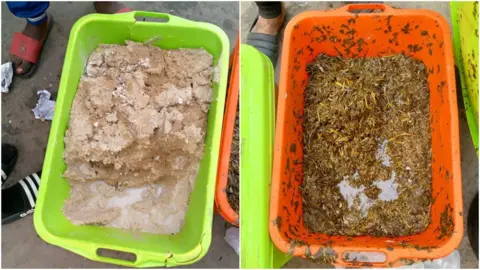 Stanis Bujakera
Stanis BujakeraIn an effort to keep away from malnourishment, many prisoners depend on their kinfolk to deliver meals into them.
Nevertheless, not everybody has these connections.
In 2017, a charity reported that not less than 17 prisoners starved to demise following meals shortages in Makala.
Mr Manketa mentioned it was “doable” that Makala’s testing surroundings led to the tragic try to flee.
To keep away from a repeat, the authorities ought to construct new prisons and enhance current ones, he argues.
Bujakera, who’s now based mostly in the USA, mentioned this transformation should occur swiftly.
It’s a “sick” justice system, he lamented, and as Monday’s catastrophe demonstrated, individuals are dying whereas ready for a treatment.
Extra reporting by the BBC’s Emery Makumeno in Kinshasa.
Extra BBC tales from DR Congo:
 Getty Photos/BBC
Getty Photos/BBC





